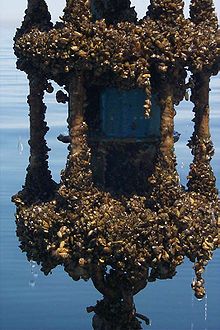All too often, this blog will feature something awesome and cool that is going extinct. The rarest, most beautiful things in nature tend to be the things that humans wipe out.
This post will be different. You are invited to kill today's creature in any way you like.

Ladies and gentlemen, meet the zebra mussel (Dreissena polymorpha). Zebra mussels are small bivalves no larger than two inches in length, native to the Caspian and Black Seas in Eurasia. Although unremarkable to look at, here in Chicago, they are quite common...and shouldn't be. Go back to Russia!
Much like the Japanese beetles, zebra mussels are a problematic invasive species. They arrive on boat hulls and spawn quickly, easily encrusting pipes and anything else their microscopic larvae happen to land on. They have not only taken over the Great Lakes, but have also been sighted in Britain, France, Ireland, Italy, Spain, the Netherlands, the Czech Republic, and Sweden. Soon they will take over the world and there will not be much that we can do about it.
Zebras mussels hurt ecosystems primarily by replacing existing mussel species. They spawn easily and quickly with fresh additions to the gene pool from passing ships. This strips native species of resources and leaves too much food for predators of said native species to handle. They're like new neighbors who play loud music at night, no matter how many people yell at them.
Putting the fishes aside for now, the zebra mussels get into human equipment. They encrust boats, docks, power plants, and anything else that touches their lake. Water purification plants are hit particularly hard, with the estimated damages in Britain being over 500,000 pounds. You don't need a currency converter to know that's a lot of damage.
Crush them. Eat them. Set them on fire. We don't hate them, but they really shouldn't be in these ecosystems! The good news is that they are slowly being overridden by the quagga mussel...
...wait, that isn't good news!
This post will be different. You are invited to kill today's creature in any way you like.

Ladies and gentlemen, meet the zebra mussel (Dreissena polymorpha). Zebra mussels are small bivalves no larger than two inches in length, native to the Caspian and Black Seas in Eurasia. Although unremarkable to look at, here in Chicago, they are quite common...and shouldn't be. Go back to Russia!
Much like the Japanese beetles, zebra mussels are a problematic invasive species. They arrive on boat hulls and spawn quickly, easily encrusting pipes and anything else their microscopic larvae happen to land on. They have not only taken over the Great Lakes, but have also been sighted in Britain, France, Ireland, Italy, Spain, the Netherlands, the Czech Republic, and Sweden. Soon they will take over the world and there will not be much that we can do about it.
 |
| In Soviet Russia, mussel eats you. |
Zebras mussels hurt ecosystems primarily by replacing existing mussel species. They spawn easily and quickly with fresh additions to the gene pool from passing ships. This strips native species of resources and leaves too much food for predators of said native species to handle. They're like new neighbors who play loud music at night, no matter how many people yell at them.
Putting the fishes aside for now, the zebra mussels get into human equipment. They encrust boats, docks, power plants, and anything else that touches their lake. Water purification plants are hit particularly hard, with the estimated damages in Britain being over 500,000 pounds. You don't need a currency converter to know that's a lot of damage.
 |
| No, they don't EAT metal, just make it unusable. |
Crush them. Eat them. Set them on fire. We don't hate them, but they really shouldn't be in these ecosystems! The good news is that they are slowly being overridden by the quagga mussel...
...wait, that isn't good news!



No comments:
Post a Comment